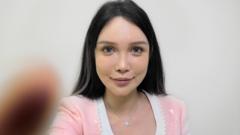Many women with polycystic ovary syndrome (PCOS) are falling victim to misleading information from social media influencers, who sell unproven tests and dietary supplements. Experts warn that these influencers are posing as health experts, creating false hope and potentially harming those with the condition.
The Dangers of Influencer Misinformation: Women Misled on PCOS Treatments

The Dangers of Influencer Misinformation: Women Misled on PCOS Treatments
Unqualified influencers are promoting unproven treatments for polycystic ovary syndrome, exploiting vulnerable women searching for answers.
In the ever-evolving world of social media, the spread of misinformation has become a significant challenge, particularly for vulnerable groups. Women suffering from polycystic ovary syndrome (PCOS) frequently seek reliable information and treatment options but increasingly find themselves misled by influencers on platforms like Instagram and TikTok.
Sophie, a woman whose persistent symptoms have included pain and depression for over a decade, turned to influencer Kourtney Simmang after feeling let down by traditional medical advice. Kourtney claimed she could address the "root cause" of PCOS through a suite of expensive tests and supplements, even though experts note that no such root cause has been established. Despite investing thousands into the program, Sophie experienced no improvement and ultimately felt worse about her relationship with her health.
Dr. Jen Gunter, a recognized specialist in women's health, stated that influencers often lack the qualifications to offer genuine medical insights or treatments. This issue is exacerbated by the absence of straightforward medical solutions for many women grappling with PCOS.
Recent research indicated that half of the most-watched content tagged "PCOS" on platforms like TikTok and Instagram conveyed inaccurate information. Common myths perpetuated by influencers include claims that PCOS can be cured entirely through dietary supplements, or that common medications, like birth control pills, exacerbate symptoms when they may actually be beneficial.
With up to 70% of women with PCOS undiagnosed globally, misinformation can derail efforts to seek effective treatment. Women struggling with the condition often feel helpless, especially when influenced by misleading claims that promise simple solutions.
Among the most followed influencers in this space is Tallene Hacatoryan, who promotes a range of supplements and advocates for lifestyle changes like the keto diet, often criticizing mainstream treatments. However, this restrictive diet can pose additional health challenges, leading women like Amy from Northern Ireland to question their self-worth and abilities.
Dr. Gunter explains that these misleading messages may contribute to the development of eating disorders among susceptible individuals. As women's health conversations continue online, the responsibility lies with both influencers and social media platforms to ensure that information shared is not only safe but scientifically valid.
With the stigma surrounding PCOS still prevalent, some women, like Medlyn from Nigeria, are shifting the narrative by encouraging open dialogue and seeking medically sound advice. There is hope in empowering women to embrace their differences and push for better medical support, though the journey remains challenging.
As a collective, women with PCOS are encouraged to consult medical professionals who specialize in the condition and seek evidence-based solutions tailored to their needs, rather than putting their faith in unverified influencer recommendations.



















